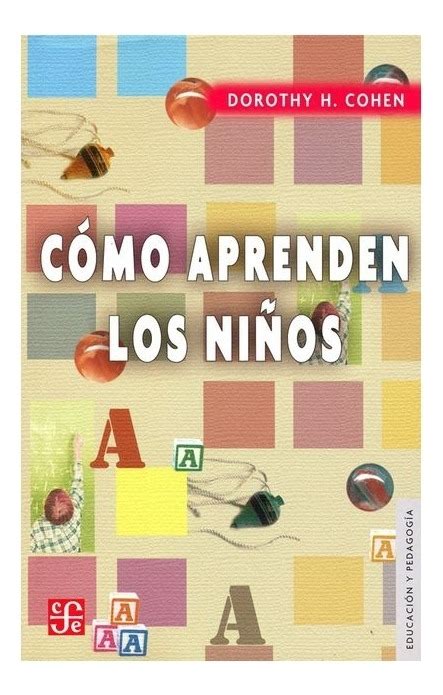Top 14 Quotes & Sayings by Dorothy H Cohen
Explore popular quotes and sayings by a writer Dorothy H Cohen.
Last updated on April 14, 2025.
The middle years are ones in which children increasingly face conflicts on their own,... One of the truths to be faced by parentsduring this period is that they cannot do the work of living and relating for their children. They can be sounding boards and they can probe with the children the consequences of alternative actions.
Children of the middle years do not do their learning unaffected by attendant feelings of interest, boredom, success, failure, chagrin, joy, humiliation, pleasure, distress and delight. They are whole children responding in a total way, and what they feel is a constant factor that can be constructive or destructive in any learning situation.
The child to be concerned about is the one who is actively unhappy, [in school].... In the long run, a child's emotional development has a far greater impact on his life than his school performance or the curriculum's richness, so it is wise to do everything possible to change a situation in which a child is suffering excessively.
Television programming for children need not be saccharine or insipid in order to give to violence its proper balance in the scheme of things.... But as an endless diet for the sake of excitement and sensation in stories whose plots are vehicles for killing and torture and little more, it is not healthy for young children. Unfamiliar as yet with the full story of human response, they are being misled when they are offered perversion before they have fully learned what is sound.
They [parents] can help the children work out schedules for homework, play, and television that minimize the conflicts involved inwhat to do first. They can offer moral support and encouragement to persist, to try again, to struggle for understanding and mastery. And they can share a child's pleasure in mastery and accomplishment. But they must not do the job for the children.
Parents must begin to discover their children as individuals of developing tastes and views and so help them be, and see, themselves as thinking, feeling people. It is far too easy for a middle-years child to absorb an over-simplified picture of himself as a sloppy, unreliable, careless, irresponsible, lazy creature and not much more--an attitude toward himself he will carry far beyond these years.
Helping children at a level of genuine intellectual inquiry takes imagination on the part of the adult. Even more, it takes the courage to become a resource in unfamiliar areas of knowledge and in ones for which one has no taste. But parents, no less than teachers, must respect a child's mind and not exploit it for their own vanity or ambition, or to soothe their own anxiety.
Nevertheless, no school can work well for children if parents and teachers do not act in partnership on behalf of the children's best interests. Parents have every right to understand what is happening to their children at school, and teachers have the responsibility to share that information without prejudicial judgment.... Such communication, which can only be in a child's interest, is not possible without mutual trust between parent and teacher.
The frantic search of five-year-olds for friends can thus be seen to forecast the beginnings of a basic shift in the parent-childrelationship, a shift which will occur gradually over many long years, and in which a child needs not only the support of child allies engaged in the same struggle but also the understanding of his parents.
Those who first introduced compulsory education into American life knew exactly why children should go to school and learn to read: to save their souls.... Consistent with this goal, the first book written and printed for children in America was titled Spiritual Milk for Boston Babes in either England, drawn from the Breasts of both Testaments for their Souls' Nourishment.






















